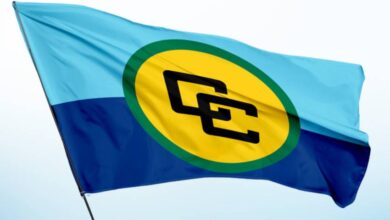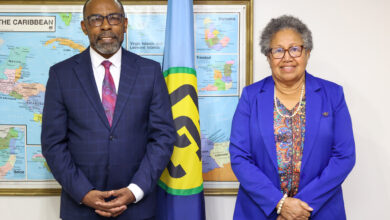(CARICOM Secretariat, Turkeyen, Greater Georgetown, Guyana) Honourable Heads of Government, High Officials and Dignitaries of State Officers of CARICOM Friends, it is my honour and pleasure to welcome you to the Republic of Suriname. Today is March 8, International Women’s Day and also the Celebration of Holi Phagwah, both auspicious occasions for us in this Region.
Let me begin by ‘hailing up’ all the women of the Region -not in the least the Honourable Kamla Persaud-Bissessar and the Honourable Portia Simpson Miller whose recent successes at the polls ought to be an occasion for celebration for the women of CARICOM.
Phagwah and the burning of the Holi is about new beginnings, about the time for planting of the new seed. I therefore call on all my fellow leaders to join me in the renewed commitment to the region – badly in need of a new seed – that must begin with the recognition of the role, realities and just aspirations of our sisters, especially those we see so little of on such occasions, our sisters who live removed from the coast in our hinterland and in our indigenous and traditional communities.
We in this Region know that it is the women who stood firm through all our trials from slavery and indentureship, and through our independence struggles. They continue to be mostly responsible for the transmission of knowledge in the home, in the community and in the classroom. They are still the foundation of all care given, whether this work is paid for or not. And were we to truly count and value their labour, we would recognize how much the women of this region contribute to our well being, and how much they are owed and deserve.
How can we pay this historic debt to our women – our grandmothers, mothers, sisters, daughters? We can begin by honouring the commitments we have made in this region to make our countries safe.
But perhaps the greatest intervention can come from improving the economic circumstances of poor and vulnerable families throughout the region.
This will only be possible if the region undertakes with a renewed vigour a new beginning. We must not only take account of our failures, but permit new energy to infuse our possibilities. Untold and unrealized entrepreneurship resides with the women of the Region. Let us commit to marking this day, March 8th, as a day that CARICOM Heads committed to a new partnership with our women.
I call on the Secretariat to enable this process so that we can ensure that we begin our institutional arrangements with the fulfilment of the promise of inclusivity and participation of women in the Region. This may add time, but it will improve quality, of that I am sure.
CARICOM friends, the in-depth analysis of our institutions must lead us to a better way of doing things, a faster response to false starts and wrong directions and, more importantly, to the meaningful and effective participation of our citizens in all areas and throughout the entire Region. This is a tall order, especially when global economic anxiety is so high.
We not only require a better and more empowered Secretariat, we need also the political will from US, elected officials, to further the integration agenda even as our peoples do on their own – traversing sometimes through unfriendly waters and turbulent skies across the region, to make sense of the opportunities as they know them to exist.
We should welcome our peoples’ conviction that their lives can be made better within the region, and not force our talent to migrate beyond.
All of us know that this free movement of our people and skills has the possibility of raising the fears of our citizens who, as they often say, “born right yeh – it belong to us.”
But we know that the Caribbean resourcefulness has enriched many a developed country. Why, then, do we have doubts that we can enrich each other’s societies?
To execute its mandate, the Secretariat needs predictable financial resources, which means we must pay our dues as a matter of priority.
We must provide the funding for the institutions we have created in our name, and we must open ourselves to wider input as to how these commitments can be honoured.
Our citizens and private sectors are more than capable of addressing this challenge of financial resources for integration and development.
While we firmly believe in the principles of sustainable development, as articulated in 1992 at the Rio Earth Summit – soon to be reviewed- we also believe that we must be more creative in the use of our own resources and skills. As Bob Marley said, we must “emancipate ourselves from mental slavery”.
The obstacles that are hindering our people are not of their making. And so, we as governments must not merely commit to paper rights but be bold enough to find new ways of working together, rationalizing production. We must nurture our interdependency and cut the ties of dependency. We must draw on our history and build on our diversity.
Suriname is ready and able to play its part in this regional challenge.
The report of the consultants identifies constraints and opportunities, and we welcome this. Let me take this opportunity to bring praise to the quality of the report and the recommendations made, under leadership of the honourable Richard Stoneman. But knowing the problem can only be a first step.
Friends, we have to face the fact that we as elected officials often use the shortage of financial means as an easy way out, when we choose to refrain from implementing programs of a sustainable nature.
Suriname sees no merit in merely restating this fact or belief. In fact, we believe that if we harness our technological resources, enable our human resources – our true capital – engage our private sector and reward innovation and creativity, including that of our diaspora, and combine our natural and financial resources, that the true potential of our region, rich in so many ways, CAN be realized.
Citizens of CARICOM, we have no reason to be poor. Look at what we have amongst us: oil, gas, gold, diamonds, bauxite, forests, sea, sun, sugar, rice, spice, coffee, water, and so much more. Add that to our labour force; liberate our intellectuals and artists to dream big dreams; support our own businesses through the creation of multi-national Caribbean entities with public shareholding; and simplify the rules of engagement at all levels. Then we can do much, much more than survive. We can flourish.
Imagine if we committed to ending donor support; make self-sufficiency our cornerstone of development; reduce our taste for things we do not produce, and increase it for the things we do produce; wipe out the unsustainable food bill; build on our food export potential to our natural market: the diaspora and even beyond; restore and enhance our built and natural heritage; draw on the wisdom of our natural healers and herbalists: take account of the nutraceuticals that Prime Minister Simpson Miller has recently spoken of. Grow our talent. What more do we need to convince us of our capacity than a USAIN BOLT, a BRIAN LARA, an ANTHONY NESTY and all the other athletes that are of us, but live and train elsewhere.
And that leads me to our youth and sports. Suriname has made real our commitment to both the launch of the Youth Ambassadors’ website and the introduction of the Caribo game.
My government believes that the involvement of our children at an early age, contributes to the strength and the very survival of this Region. We believe that they can be trusted to secure our integration process. The more our children are involved, the stronger CARICOM will be.
It is through the experience of integration that pride in our region will mature.
CARICOM integration, the full realization of the Treaty of Chaguaramas must not be about paper, agreements and protocols, it must live. And it must live most vibrantly in our sons and daughters.
Today, you will bear witness to the launch of the Regional Sport Academy logo, and you will be introduced to the first group of students who will begin the pilot training program. Colleagues and Citizens of CARICOM, young and old, you may know that I have recently concluded a mission to Haiti with other colleagues from the Bureau. Our able Secretary General, Irwin LaRocque, accompanied us on that visit.
I am proud to have had the privilege of leading this mission, and I use this opportunity to thank all those who accompanied us and the government and people of Haiti who so graciously welcomed us.
As a result of this visit and the exchange of views with the leadership in Haiti, who regrettably are not with us today, we have concluded a Memorandum of Understanding on how to assist our sister nation that has endured such enormous suffering in the recent past.
We must remain committed to implement to the fullest extent what we have agreed upon. A strong and recovered Haiti will immensely strengthen our community.
Finally, citizens of the Caribbean, I am aware that the task before us is formidable, but we are an equally formidable people, as our history has shown time and again.
Our generational duty, our task as leaders, is to make real now more than ever in this shaky world, the prosperity, the peace, and the sustainable development that our children deserve, now and into the future.
As we throw water, sprinkle a beer, light the holi and celebrate with our Hindu brothers and sisters the Holi Phagwah, let us celebrate our diversity and be guided across our own religious and spiritual beliefs to the importance of joint endeavour. And let us also recognize those rare historic moments when we are called upon to make new beginnings!
I thank you.




